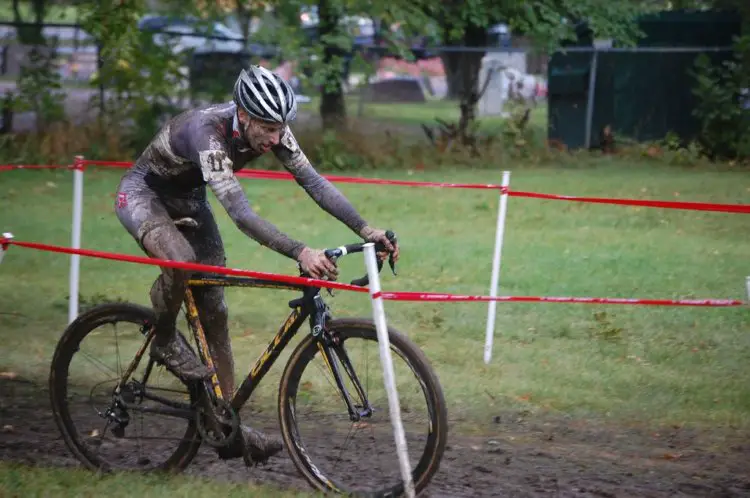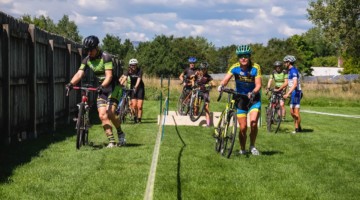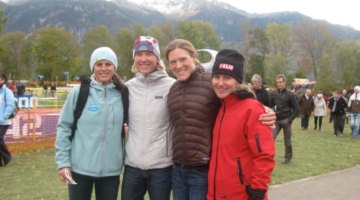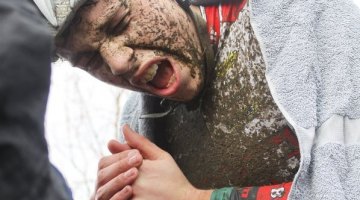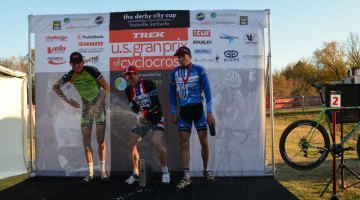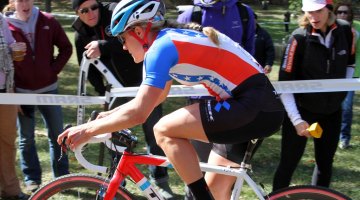Tristan Schouten, one of our oft-mentioned “Working Men” of pro cyclocross found time in his busy schedule, between work, training and racing, to sit down to answer a few questions for us. And we had quite a few, because anyone who can pull off a fourth-place finish in a USGP (the second day of Fort Collins USGP two weeks ago) while working a day job deserves some serious recognition.
Cyclocross Magazine: The obvious: who are you riding for this season?
Tristan Schouten: Actually, there have been some issues with USACycling and the USGP Series with the wrong team being displayed on the results this year, which has been a bit frustrating, but for the second year now I am on Cyclocrossracing.com p/b Blue Bicycles. I am also sponsored by Rolf Prima wheels, Lazer Helmets and GU products.

Tristan Schouten at USGP Madison. © Mike Janikowski
CXM: What bike are you riding this season?
TS: It’s the same bike as last year — the Norcross SL. It’s a great bike and I am very happy with it. It is really nice to have Blue support me with top-of-the-line equipment each year that is reliable and good.
CXM: What’s your season looking like: more USGP, Nationals, Europe? What are your main goals and big races?
TS: After last season, I wanted to make my goals the USGP races and Nationals since they are in Wisconsin this year. We also have some great races in the Midwest like the Cincinnati weekend and Jingle Cross in Iowa that I am looking forward to. Going into the season, I wanted to build on last year’s top fives that I got at several USGPs and be consistent at those. So far it hasn’t gone that smoothly, but we’re just getting into the season and it’s already turning around a little. Definitely a top three is a main objective though for Madison and if I can get consistent and get top fives at USGPs through the season, that should be doable.
CXM: How did you feel about your huge result at the USGP in Fort Collins? Is that your best result to date? Did you expect it?
TS: Obviously I was really excited to pull that one off. It really came out of nowhere because the day before I just had a horrible day on the bike and I was really disappointed in myself. Last season, I had several top fives and a bunch of sixths and sevenths at USGPs, so when I am riding good and things go right, a result like that is well within my reach. I guess I was most surprised though because the day prior I couldn’t get out of 60% zone and on day two, I had an “extra gear.” I think it mostly has to do with the traveling I’m doing and not being able to open up before the races properly and it’s just been a bit hit or miss with what is going to work on any day. I need to get my training in order and once that happens I should be able to get more consistent and hope to see the podium this year.
CXM: You’re clearly starting off the season with a bang. How will you handle the fact that it lasts another three months? Will you take a break?
TS: Well, I’ve worked with my coach Gordon Paulson all season based on the length of the cyclocross season and I basically leave that to him to figure out. I do a lot of mountain bike and road racing all summer, and this year I took two two-week long breaks. The last one I took late in August. I’ve struggled a bit getting my legs back after the second break, but last year I was flying in September and got three or four fifth place results early on in the season. But then I really struggled late in the season. The last few weeks I felt I have struggled a bit to get going and I really have not had very good races until two weeks ago in Gloucester, where I found some good feelings. Then this last weekend in Fort Collins, it finally opened up for me. I’m hoping this year it is just taking me a little bit longer to get good form back but then hopefully I’ll be going good by November/December and able to hang on until Nationals.
CXM: How do you handle juggling being a working man and a clearly blossoming pro?
TS: I have mixed feelings on the issue and usually those depend on how the last weekend of racing went. It is very difficult and a couple times I’ve almost cracked. I have to be very mentally tough to cope with it. It is extremely easy to get dug in a hole working 45 hours a week, averaging six hours of sleep a night, and trying to train when you just want to sit on the couch for ten minutes and relax — but I don’t have ten minutes because then my tires wouldn’t get glued, or my bikes wouldn’t get cleaned from the weekend, or the car wouldn’t get new brakes, or the lawn wouldn’t get mowed … and the list just goes on. I maybe get ten minutes a week at home to sit on the couch on a Sunday night if I am home from racing early. I have to be very organized and keep about two months ahead of myself, otherwise things build up and there aren’t enough hours in the day to physically complete it. It gets even more complicated when you throw travel in the equation, since it shortens my week by two days. I only have enough vacation days to take a Friday off to get to the race, so Mondays I am usually screaming out of Mitchel International Airport in Milwaukee at 1:30 p.m. trying to get to work by 3 p.m. so I don’t get fired, and that makes for extremely long days.
But, for some reason, I am able to compete even though I run the needle to “E” all the time. I think most of it is just being mentally strong enough to shut out all the things I did wrong during the week that you shouldn’t be doing as a “pro” and just lining up and pinning it and seeing what happens. There are lots of times I am able to prepare properly, sleep enough, get in good training and still have bad legs and other times I have raced on two hours of sleep and tore other peoples’ legs off. Sometimes I am not even sure if it makes a difference at all how you prepare, but I do know it would be nice to sit on my couch once and a while, at least more than I do now.
As far as being a blossoming pro, I do think cycling is a bit messed up compared to other sports in that regard. I work for a living doing something entirely different than racing my bike for a paycheck, so in any other sport I would not be considered a “pro.” For some reason, in cycling we all get lumped in together though and generally you can see a distinct line between the paid pros and the rest of us, although I do get a bit of a smug feeling when I beat up on some of those guys occasionally.
CXM: Best advice for other working pros/wannabe pros?
TS: When you read that you should be getting ten hours of sleep, putting out this many watts per kilo, resting a lot with your feet up and all those other things, pretty much ignore them because it will drive you nuts trying to prepare the “right” way. Find a good coach, find a good wife who makes sure you are fed and your dinner is packed for work, buy a Burley if you have a kid and incorporate easy days into Burley rides so you can spend that extra time with them, and toughen up mentally. If you have to work until midnight and leave for the race at 4 a.m., then that’s what you do. You just do it and ignore the fact that all of your friends drove the day before and slept at the race. It doesn’t matter and you can laugh when you beat them because you have twice the mental focus and toughness that they do.
CXM: Tom Schuler, the Nats race director, mentioned you as one of the Guys to Watch for Madison this year- thoughts?
TS: I hope he is right! I think with racing in January in Wisconsin, there are going to be a lot of surprises and a lot of people that aren’t going to know what hit them when they show up and it’s -5 degrees at nine in the morning. And I’m not talking Celsius. I have ridden when it’s zero degrees out, but I don’t do much riding below 20 degrees, it’s just not worth it. I train in bad/cold weather probably four months a year, so I do know how to do it and I think that is a big advantage. I also have the advantage of preparing from home leading up to and on the day of the race, so I can prep for exactly what will be coming our way because despite the starry-eyed description of January in Wisconsin where it’s sunny and in the mid 20s, it’s got way more potential to be 10 degrees and 30 mph wind and you just can’t prepare for that if you are flying in on a plane.
For once, I’ll have the advantage of not traveling to the race with limited supplies. Plain and simple having a bike race in January in Wisconsin is pretty ridiculous. It’s one thing to risk some fingers and toes going out when it’s 15 with full thermal clothing, but racing in that stuff would be impossible. So, I guess I’d like to think I know how to prepare and be acclimated, but when it comes down to it I have no idea what is coming our way and whether it will give me an advantage.
CXM: I have to ask — what happened different on day one of the USGP and day two? Your results were so wildly different, from 27th to fourth! Mechanical, or just bad luck?
TS: Pretty much what I talked about before. I haven’t been able to prepare correctly during the week because I am too tired from the travel on the weekends. Then, I get a bit flat or stale and when it’s time to go hard, I’m just stuck at 60% blowing out the carbon. Day two’s always goes better for me because I’m opened up much better. As my fitness comes around and I can do better openers Thursdays/Fridays, I should be more consistent but the last four weeks have been killers as far as travel/training/preparing for a race have gone.
CXM: You’re clearly traveling a lot this season — how does that happen with being a normal working man?
TS: I have five days of vacation this year so it doesn’t work very well at all. I saved them all for cyclocross season so basically that means we have no family vacation. Next year, I’ll be at two weeks vacation time, so things should be different. I trade a lot of my Saturdays I’m scheduled for with the other guys, but that just means the weeks I am home, I’m pretty much working every Saturday to get them back.
CXM: Speaking of travel, how do you train when you’re on the road so much? What’s a normal week look like for you?
TS: This time of the year it’s not very good, but ’cross season is a little different for me because the rest of the year I only race in the Midwest and don’t have to fly or travel nearly as much. Now, if I race twice over the weekend and I have to travel to get there, basically I don’t get home from the race until Midnight on Monday when I get out of work. If I’m lucky, I’m able to sneak my bikes in at work and put them back together, bonus if I have time to clean them.
Tuesday I try to do about two hours to clean out the legs. Wednesday would be a specific workout with efforts and intervals, if I feel I have recovered and the legs are good. Thursday is a Burley ride with my daughter, unless I was too tired on Wednesday for efforts, then I might try them Thursday. Friday is either a blow-out ride or back on the plane and hopefully a ride when I land. Maybe six hours of training a week. Now that I have about three weeks between big races, I’ll be able to do about 10-12 hours a week and that would be normal for me. I can get going pretty good on that. Also, for me, the rest of the season is going to be almost all drivable and that will be a huge help. I’ll get back into my routine that I am used to and I know I can ride better in it.
CXM: Best part of racing cyclocross?
TS: When I deposit money in the bank, if I managed to win some.













